小学英语语法副词
- 格式:docx
- 大小:13.85 KB
- 文档页数:5
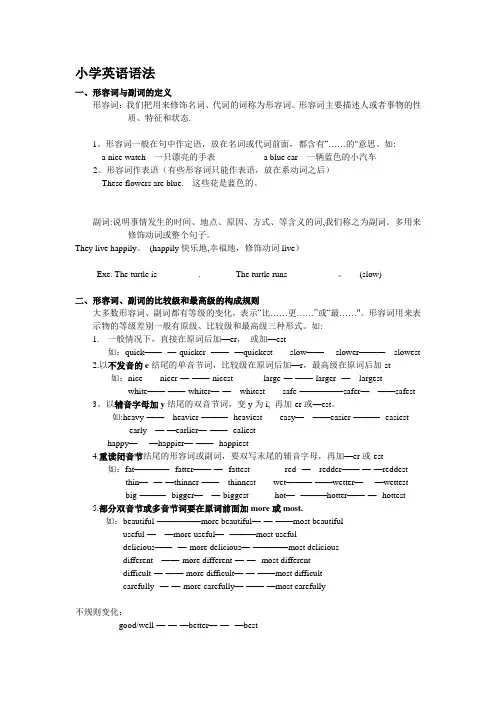
小学英语语法一、形容词与副词的定义形容词:我们把用来修饰名词、代词的词称为形容词。
形容词主要描述人或者事物的性质、特征和状态.1。
形容词一般在句中作定语,放在名词或代词前面,都含有“……的"意思。
如:a nice watch 一只漂亮的手表 a blue car 一辆蓝色的小汽车2。
形容词作表语(有些形容词只能作表语,放在系动词之后)These flowers are blue. 这些花是蓝色的。
副词:说明事情发生的时间、地点、原因、方式、等含义的词,我们称之为副词。
多用来修饰动词或整个句子。
They live happily。
(happily快乐地,幸福地,修饰动词live)Exe. The turtle is _________. The turtle runs ___________。
(slow)二、形容词、副词的比较级和最高级的构成规则大多数形容词、副词都有等级的变化,表示“比……更……”或“最……"。
形容词用来表示物的等级差别一般有原级、比较级和最高级三种形式。
如:1.一般情况下,直接在原词后加—er,或加—est如:quick——--—-quicker--——--—quickest slow——----slower———---slowest2.以不发音的e结尾的单音节词,比较级在原词后加—r,最高级在原词后加-st如:nice------nicer-—-——-nicest large-—-——-larger--—---largestwhite——-——-whiter—-—---whitest safe-—————safer—---——safest 3。
以辅音字母加y结尾的双音节词,变y为i, 再加-er或—est。
如:heavy-——---heavier-———--heaviest easy—---——easier-———--easiest early---—-—earlier—-——--ealiesthappy—----—happier—-——--happiest4.重读闭音节结尾的形容词或副词,要双写末尾的辅音字母,再加—er或-est如:fat————--fatter——-—--fattest red--—---redder——-—-—reddest thin—--—-—thinner-——---thinnest wet———-——wetter—----—wettestbig-———--bigger—---—-biggest hot—--———hotter——-—--hottest5.部分双音节或多音节词要在原词前面加more或most.如:beautiful-—————more beautiful—-—-——most beautifuluseful-—---—more useful—--———most usefuldelicious——--—-more delicious—-————most deliciousdifferent---——-more different-—-—--most differentdifficult-—-——-more difficult—-—-——most difficultcarefully--—-—-more carefully—-——-—most carefully不规则变化:good/well-—-—-—better—-—--—bestbad—--———worse---———worstmany/much—----—more—-———-most little———-—-less-————-leastfar—--——-farther—————-farthest (指距离的远近)far-—-——-further——--——furthest (表示程度上更进步)old—---—-older---—--oldest (表示年纪大)old--——-—elder-——-——eldest (表示长幼关系)三、形容词、副词比较级的用法表示两者间的比较用比较级。

小学英语语法之副词集团文件发布号:(9816-UATWW-MWUB-WUNN-INNUL-DQQTY-小学英语语法之副词副词的意义:用来修饰动词、形容词、其他副词和全句的词,表示时间、地点、程度、方式等。
如Cars run fast.(副词修饰动词run)It is raining heavily outside.( 副词修饰动词rain)These candies are very delicious. (副词修饰形容词delicious) I can't work too quickly.( 副词修饰副词quickly)Luckily, Ms Black won the lottery.(副词luckily修饰全句)副词的分类:时间副词:today, tomorrow, yesterday, always, often, now, before地点副词:here, there, down, up, down方式副词:slowly, badly, hard, fast程度副词:very, much, still, almost, too疑问副词:why, what, where, when, how副词的位置1.副词修饰动词、动名词、名词时,通常放在被修饰动词的后面。
I’m working carefully.She is working hard.2.副词修饰形容词、副词时,通常位于被修饰的词前。
The book is very interesting, I like it very much.She swims quickly enough.3.副词修饰数词时,通常位于数词前。
The women is over forty, but she looks very young.副词的排列顺序1.副词表示时间地点时,小单位在前,大单位在后。
Next week, I’ll reach Kunming, China.Lucy was born on November 12th,1985,in Changchun, Jilin Province.2.副词表示方式时,拼写短的在前,拼写长的在后,并用and或者but连接。
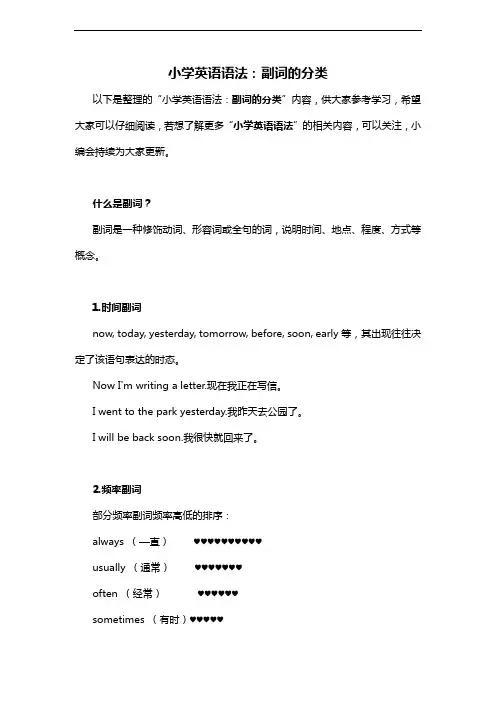
小学英语语法:副词的分类以下是整理的“小学英语语法:副词的分类”内容,供大家参考学习,希望大家可以仔细阅读,若想了解更多“小学英语语法”的相关内容,可以关注,小编会持续为大家更新。
什么是副词?副词是一种修饰动词、形容词或全句的词,说明时间、地点、程度、方式等概念。
1.时间副词now, today, yesterday, tomorrow, before, soon, early等,其出现往往决定了该语句表达的时态。
Now I'm writing a letter.现在我正在写信。
I went to the park yesterday.我昨天去公园了。
I will be back soon.我很快就回来了。
2.频率副词部分频率副词频率高低的排序:always (—直)♥♥♥♥♥♥♥♥♥♥usually (通常)♥♥♥♥♥♥♥often (经常)♥♥♥♥♥♥sometimes (有时)♥♥♥♥♥seldom (很少)♥♥♥♥hardly (几乎不)♥♥♥never (从不)还有说明次数的副词,once, twice等。
频率副词经常出现在一般现在时态的语句中,表示规律性的动作或习惯。
Ben often goes to the cinema with his friend.本经常和他的朋友岀去看电影。
He never eats hamburgers.他从不吃汉堡包。
3.地点副词here, everywhere, anywhere, in, out, inside, outside, above, below, down,back, forward, home, along, round, around, near, off, past, up, away 等地点副词一般表示事情发生的地点。
He played basketball here yesterday他昨天在这里打篮球。
It's raining outside.外面正在下雨。

小学英语语法之副词Revised on November 25, 2020小学英语语法之副词副词的意义:用来修饰动词、形容词、其他副词和全句的词,表示时间、地点、程度、方式等。
如Cars run fast.(副词修饰动词run)It is raining heavily outside.( 副词修饰动词rain)These candies are very delicious. (副词修饰形容词delicious)I can't work too quickly.( 副词修饰副词quickly)Luckily, Ms Black won the lottery.(副词luckily修饰全句)副词的分类:时间副词:today, tomorrow, yesterday, always, often, now, before地点副词:here, there, down, up, down方式副词:slowly, badly, hard, fast程度副词:very, much, still, almost, too疑问副词:why, what, where, when, how副词的位置1.副词修饰动词、动名词、名词时,通常放在被修饰动词的后面。
I’m working carefully.She is working hard.2.副词修饰形容词、副词时,通常位于被修饰的词前。
The book is very interesting, I like it very much.She swims quickly enough.3.副词修饰数词时,通常位于数词前。
The women is over forty, but she looks very young.副词的排列顺序1.副词表示时间地点时,小单位在前,大单位在后。
Next week, I’ll reach Kunming, China.Lucy was born on November 12th,1985,in Changchun, Jilin Province.2.副词表示方式时,拼写短的在前,拼写长的在后,并用and或者but连接。
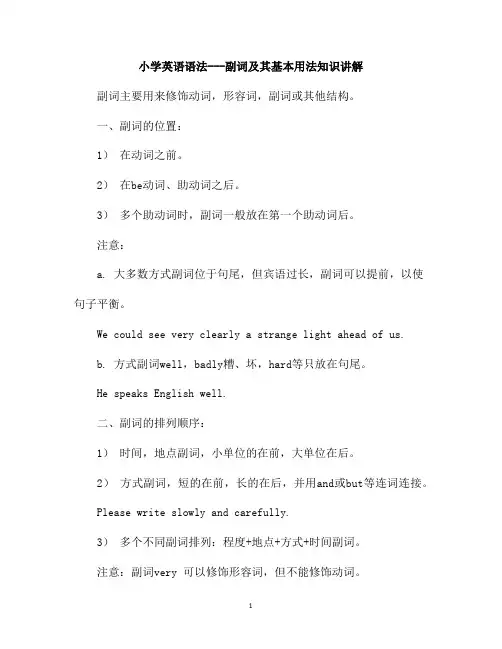
小学英语语法---副词及其基本用法知识讲解
副词主要用来修饰动词,形容词,副词或其他结构。
一、副词的位置:
1)在动词之前。
2)在be动词、助动词之后。
3)多个助动词时,副词一般放在第一个助动词后。
注意:
a. 大多数方式副词位于句尾,但宾语过长,副词可以提前,以使句子平衡。
We could see very clearly a strange light ahead of us.
b. 方式副词well,badly糟、坏,hard等只放在句尾。
He speaks English well.
二、副词的排列顺序:
1)时间,地点副词,小单位的在前,大单位在后。
2)方式副词,短的在前,长的在后,并用and或but等连词连接。
Please write slowly and carefully.
3)多个不同副词排列:程度+地点+方式+时间副词。
注意:副词very 可以修饰形容词,但不能修饰动词。
改错:(错) I very like English.
(对) I like English very much.
注意:副词enough要放在形容词的后面,形容词enough放在名词前后都可。
I don‘t know him well enough.
There is enough food for everyone to eat.
There is food enough for everyone to eat.。
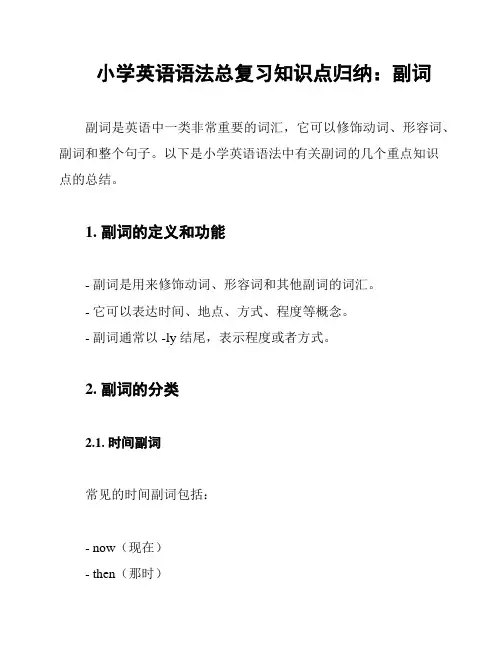
小学英语语法总复习知识点归纳:副词副词是英语中一类非常重要的词汇,它可以修饰动词、形容词、副词和整个句子。
以下是小学英语语法中有关副词的几个重点知识点的总结。
1. 副词的定义和功能- 副词是用来修饰动词、形容词和其他副词的词汇。
- 它可以表达时间、地点、方式、程度等概念。
- 副词通常以 -ly 结尾,表示程度或者方式。
2. 副词的分类2.1. 时间副词常见的时间副词包括:- now(现在)- then(那时)- always(总是)- often(经常)- sometimes(有时候)- never(从不)2.2. 地点副词常见的地点副词包括:- here(这里)- there(那里)- everywhere(到处)- nowhere(无处/任何地方都不)2.3. 方式副词常见的方式副词包括:- quickly(快速地)- slowly(慢慢地)- well(好地)- badly(糟糕地)- loudly(大声地)- quietly(安静地)2.4. 程度副词常见的程度副词包括:- very(很)- quite(相当)- pretty(相当)- extremely(极其)- slightly(稍微)3. 副词的用法- 副词通常用于修饰动词,表达动作的方式、频率或者程度。
- 副词可以放在动词前面或者后面。
如果是短副词(如 well, fast),通常放在动词前面,而长副词(如 beautifully, quickly)则通常放在动词后面。
- 副词也可以用于修饰形容词或其他副词。
如:She is extremely tall.(她非常高。
)4. 注意事项- 副词不可以修饰名词。
- 副词的位置可以根据需要进行灵活调整。
以上是小学英语语法中关于副词的主要知识点总结。
希望对你的学习有所帮助!。
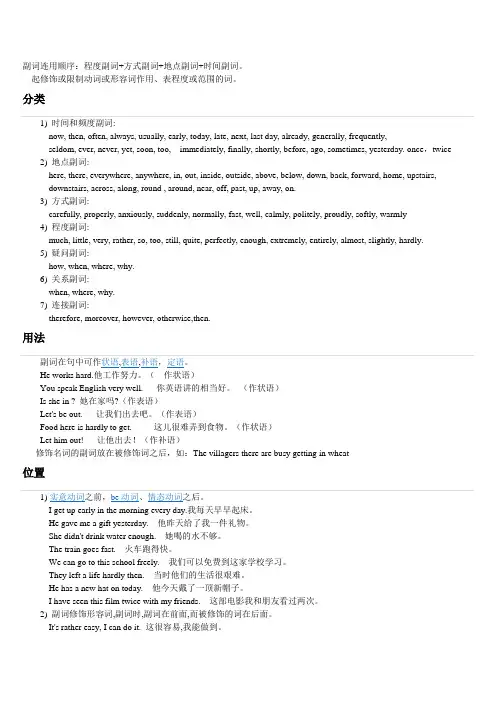
副词连用顺序:程度副词+方式副词+地点副词+时间副词。
起修饰或限制动词或形容词作用、表程度或范围的词。
分类1) 时间和频度副词:now, then, often, always, usually, early, today, late, next, last day, already, generally, frequently,seldom, ever, never, yet, soon, too, immediately, finally, shortly, before, ago, sometimes, yesterday. once,twice2) 地点副词:here, there, everywhere, anywhere, in, out, inside, outside, above, below, down, back, forward, home, upstairs, downstairs, across, along, round , around, near, off, past, up, away, on.3) 方式副词:carefully, properly, anxiously, suddenly, normally, fast, well, calmly, politely, proudly, softly, warmly4) 程度副词:much, little, very, rather, so, too, still, quite, perfectly, enough, extremely, entirely, almost, slightly, hardly.5) 疑问副词:how, when, where, why.6) 关系副词:when, where, why.7) 连接副词:therefore, moreover, however, otherwise,then.用法副词在句中可作状语,表语,补语,定语。
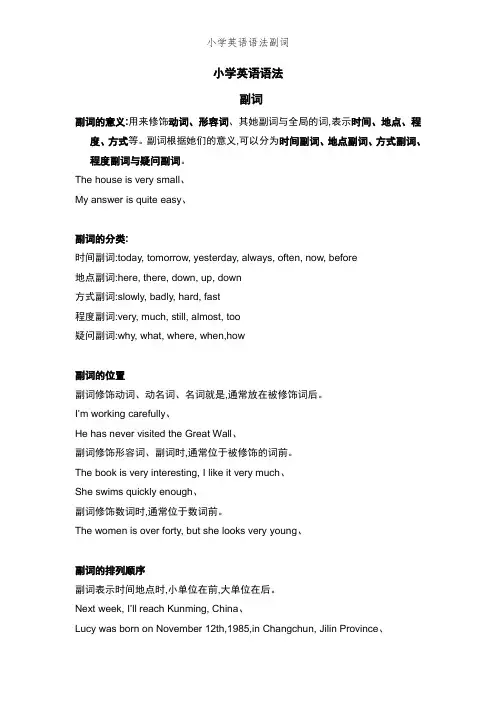
小学英语语法副词副词的意义:用来修饰动词、形容词、其她副词与全局的词,表示时间、地点、程度、方式等。
副词根据她们的意义,可以分为时间副词、地点副词、方式副词、程度副词与疑问副词。
The house is very small、My answer is quite easy、副词的分类:时间副词:today, tomorrow, yesterday, always, often, now, before地点副词:here, there, down, up, down方式副词:slowly, badly, hard, fast程度副词:very, much, still, almost, too疑问副词:why, what, where, when,how副词的位置副词修饰动词、动名词、名词就是,通常放在被修饰词后。
I’m working carefully、He has never visited the Great Wall、副词修饰形容词、副词时,通常位于被修饰的词前。
The book is very interesting, I like it very much、She swims quickly enough、副词修饰数词时,通常位于数词前。
The women is over forty, but she looks very young、副词的排列顺序副词表示时间地点时,小单位在前,大单位在后。
Next week, I’ll reach Kunming, China、Lucy was born on November 12th,1985,in Changchun, Jilin Province、副词表示方式时,拼写短的在前,拼写长的在后,并用and或者but连接。
Can you say it slowly and clearly?形容词、副词的转化副词的比较等级副词比较等级的构成单音节副词与个别双音节副词加-er或者-est构成比较级与最高级大多数双音节副词与所有多音节副词在前面加more或者most构成比较级与最高级2副词比较级的用法副词原级的用法副词的原级用于两个人或事物的比较,表示两者相等She can run as fast as me 、I often come to school as early as you、副词比较级的用法用于两个人或事物的比较,表示“比……更……”My mum usually gets up earlier than me、He did more quickly than I did、副词最高级的用法用于三个或三个以上人或事物之间的比较,表示“最……”Joy runs the fastest in my class、Lily sang the best of all the singers、TEST写出一下词的比较级及最高级Well-_________ -__________ badly-_____________-__________ Much-__________-____________ little-______________-___________ 汉译英苏珊的英语没有她姐姐的英语说得好。
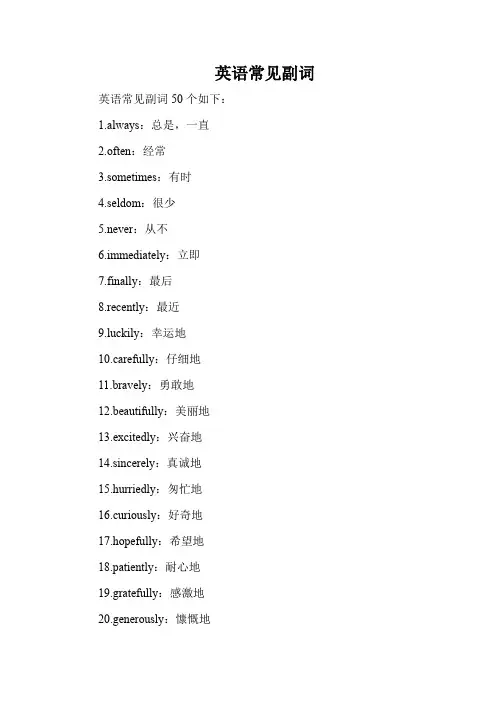
英语常见副词英语常见副词50个如下:1.always:总是,一直2.often:经常3.sometimes:有时4.seldom:很少5.never:从不6.immediately:立即7.finally:最后8.recently:最近9.luckily:幸运地10.carefully:仔细地11.bravely:勇敢地12.beautifully:美丽地13.excitedly:兴奋地14.sincerely:真诚地15.hurriedly:匆忙地16.curiously:好奇地17.hopefully:希望地18.patiently:耐心地19.gratefully:感激地20.generously:慷慨地21.indirectly:间接地22.frequently:频繁地23.loudly:大声地24.proudly:自豪地25.secretly:秘密地26.smoothly:顺利地27.suddenly:突然28.passionately:热情地29.confidently:自信地30.gratefully:感激地31.roughly:粗略地32.responsibly:负责任地33.peacefully:和平地34.luckily:幸运地35.successfully:成功地36.luckily:幸运地37.creatively:创造性地38.efficiently:高效地39.ambitiously:雄心壮志地40.cautiously:谨慎地41.painstakingly:刻苦地42.unwillingly:不乐意地43.respectively:分别地44.wholeheartedly:全心全意地45.unexpectedly:出乎意料地46.understandably:可理解地47.unexpectedly:出乎意料地48.thankfully:感激地49.fortunately:幸运地50.eventually:最终。
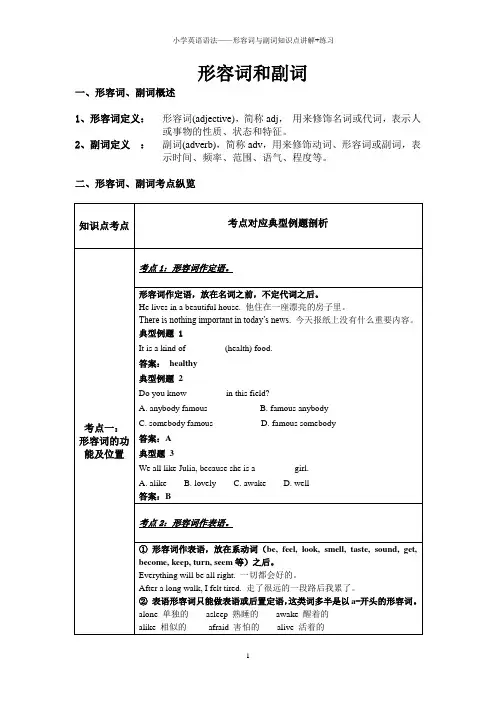
形容词和副词一、形容词、副词概述1、形容词定义:形容词(adjective),简称adj,用来修饰名词或代词,表示人或事物的性质、状态和特征。
2、副词定义:副词(adverb),简称adv,用来修饰动词、形容词或副词,表示时间、频率、范围、语气、程度等。
二、形容词、副词考点纵览三、综合练习( ) 1. How beautifully she sings! I have never heard _____ voice.A. a betterB. a bestC. the betterD. the best ( ) 2. She looks very _____ but I can’t remember her name.A. similarB. familiarC. friendlyD. strange ( ) 3. Children all looked _____ at the broken model plane and felt quite _____.A. sad; sadB. sadly; sadlyC. sad; sadlyD. sadly; sad( ) 4. The child dreamed that he had once lived in a _______ house in the forest.A. wooden pretty littleB. little pretty woodenC. pretty little woodenD. wooden little pretty( ) 5. ---Which team is _______ to win the game?---I don’t know, but I’ve found _______ for ours to win.A. probable; it unlikelyB. likely; it possibleC. possible; it possibleD. likely; it possibly( ) 6. With the development of the Internet, _______ communication is done by regular mail.A. lessB. moreC. littleD. few( ) 7. ---If you don’t like the red coat, take the blue one.---OK, but do you have ______ size in blue? This one’s a bit tight for me.A. a bigB. a biggerC. the bigD. the bigger( ) 8. If there were no examinations, we should have ______ at school.A. the happiest timeB. a more happier timeC. much happiest timeD. a much happier time( ) 9. This dress is prettier, but it costs ______ that one.A. twice more thanB. twice as much asC. as much twice asD. twice so much as( ) 10.________students are required to take part in the boat race.A. Ten strong young ChineseB. Ten Chinese strong youngC. Chinese ten young strongD. Young strong ten Chinese( ) 11. Allen had to call a taxi because the box was ____to carry all the way home.A. much too heavyB. too much heavyC. heavy too muchD. too heavy much( ) 12. Our neighbor has ________ours.A. as a big house asB. as big a house asC. the same big house asD. a house the same big as( ) 13. We were in ________when we left that we forgot the airline tickets.A. a rush so anxiousB. a such anxious rushC. so an anxious rushD. such an anxious rush( ) 14. ---I was riding along the street and all of a sudden, a car cut in and knocked me down.---You can never be ________careful in the street.A. muchB. veryC. soD. too( ) 15. ---You don’t look very ________.Are you ill?---No,I’m just a bit tired.A. goodB. wellC. strongD. healthy( ) 16. Four of Robert’s children were at the party,including ________, Luke.A. the eldestB. an oldest oneC. the oldD. an old one( ) 17. Many students signed up for the ________race in the sports meeting to be held next week.A. 800-metre-longB. 800-metres-longC. 800 metre lengthD. 800 metres length( ) 18. It’s always difficult being in a foreign country,________if you don’t speak the language.A. extremelyB. naturallyC. basicallyD. especially( ) 19. In recent years,travel companies have succeeded in selling us the idea that the further we go,__________.A. our holiday will be betterB. our holiday will be the betterC. the better our holiday will beD. the better will our holiday be( ) 20. When he heard a cry for help, he ran out as ________ as he could.A. hardlyB. quicklyC. finallyD. slowly( ) 21. “Our team is _____ to win the match.” “Really? But I don’t think so.”A. easyB. difficultC. possibleD. sure( ) 22. A ______ road goes ______ from one place to another.A. straight; straightB. straightly; straightlyC. straight; straightlyD. straightly; straight( ) 23. “This book is ______ more useful for us students.” “Yes, but it is _______ too difficult.”A. quite; quiteB. much; ratherC. rather; quite D quite; much( ) 24. There was a ______ change in the weather, and the rain came pouring down.A. quickB. slowC. fastD. sudden( ) 25. You can speak ______ in front of him, but you can’t eat ______ in his restaurant.A. freely; freelyB. free; freelyC. freely; freeD. free; free( ) 26. Tom will not be at the picnic, ______ to the family’s disappointment.A. muchB. moreC. too muchD. much more( ) 27. --- I have seen so little of Mike ______. Is he away on business?--- Oh, no. He just leaves for his office early and comes back very ______.A. later; latelyB. later; laterC. lately; lateD. late; lately( ) 28. From his ______ voice on the phone I know everything is well under way.A. satisfactoryB. satisfyingC. satisfiedD. satisfaction( ) 29. In ______ Chinese culture, marriage decisions were often made by parents for their children.A. traditionalB. historicC. peacefulD. civil( ) 30. The houses in the village are ______ built of wood and hay.A. mostB. almostC. nearlyD. mostly( ) 31. --- What do people wear when they go to the theatre?--- Well, it isn’t very ______. People can wear anything they like.A. normalB. certainC. modernD. simple( ) 32. Mary’s biology is ______ than ______ in the class.A. a lot of better; anyone else’sB. far better; anyone’s else’sC. much better; anyone elseD. a lot better; anyone else’s( ) 33. We decided not to climb the mountains because it was raining ____.A. badlyB. hardlyC. stronglyD. heavily( ) 34. Paris is one of _____ cities in the world.A. more beautifullyB. more beautifulC. the most beautifullyD. the most beautiful ( ) 35. Are you going to leave______?A. the open windowsB. the windows openingC. the windows openD. the windows opened( ) 36. Bob never does his homework _____ Mary, so he makes lots of mistakes.A. so careful asB. as carefully asC. carefully asD. as careful as.( ) 37. My sister is good at sports. She can jump ____ than me.A. highestB. very highC. too highD. much higher ( ) 38. When spring comes, the trees get ____.A. green and greenB. green and greenerC. greener and greenD. greener and greener( ) 39.He works very ___________.He _____________has a rest on Sundays.A. hard; hardlyB. hardly; hardC. hard; hardD. hardly; hardly( ) 40.He learns Russian_____________.A. goodB. niceC. wellD. fine( ) 41.The boy didn’t run______________ to catch the bus.A. fast enoughB. enough fastC. quick enoughD. enough quickly ( ) 42.Eating _____________ is bad for our health.A. much tooB. too muchC. too moreD. too many( ) 43.Have you ever seen ______________ big panda before?A. a suchB. such aC. so aD. as( ) 44.He looks very _____________ today.A. worriedB. worryC. worryingD. to worry( ) 45.Listen to me. I have _____________ to tell you.A. important somethingB. important anythingC. something importantD. anything important( ) 46. ---How ___ can you finish the drawing?--- In ten minutes.A. longB. often.C. soonD. rapid( ) 47. This book is _____ worth seeing again.A. veryB. quiteC. wellD. much( ) 48. My _____ brother is three years ____ than I .A. old; olderB. elder; olderC. older; elderD. old; elder( ) 49. We felt ___ after we watched the ___ football match.A. exciting; excitedB. excited; excitingC. excited; excitedD. exciting; exciting( ) 50. The old man lived ____ in the house, but he didn’t feel___.A. lonely; lonelyB. alone; lonelyC. alone; aloneD. lonely; alone小学英语语法——形容词与副词知识点讲解+练习参考答案1. A2.B3.D4.C5.B6.A7.B8.D9.B 10.A 11. A 12.B 13.D 14.D 15.B 16.A 17.A 18.D 19.C 20.B 21. D 22.A 23.B 24.D 25.C 26.A 27.C 28.C 29.A 30.D 31. B 32.D 33.D 34.D 35.C 36.B 37.D 38.D 39.A 40.C 41. A 42.B 43.B 44.A 45.C 46.C 47.C 48.B 49.B 50.B11。
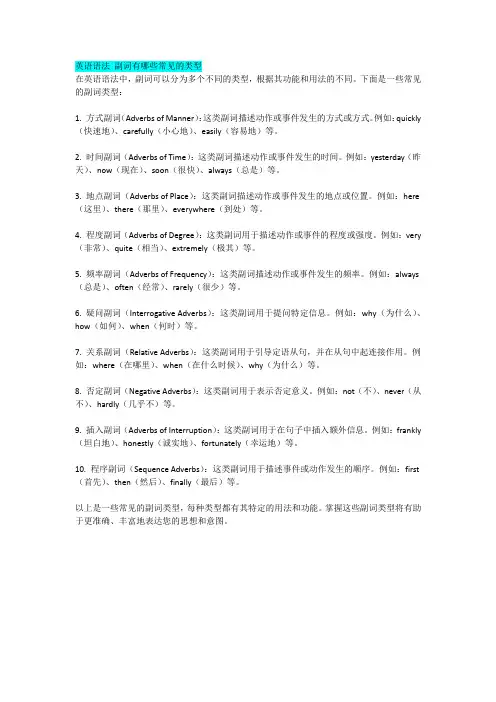
英语语法副词有哪些常见的类型在英语语法中,副词可以分为多个不同的类型,根据其功能和用法的不同。
下面是一些常见的副词类型:1. 方式副词(Adverbs of Manner):这类副词描述动作或事件发生的方式或方式。
例如:quickly (快速地)、carefully(小心地)、easily(容易地)等。
2. 时间副词(Adverbs of Time):这类副词描述动作或事件发生的时间。
例如:yesterday(昨天)、now(现在)、soon(很快)、always(总是)等。
3. 地点副词(Adverbs of Place):这类副词描述动作或事件发生的地点或位置。
例如:here (这里)、there(那里)、everywhere(到处)等。
4. 程度副词(Adverbs of Degree):这类副词用于描述动作或事件的程度或强度。
例如:very (非常)、quite(相当)、extremely(极其)等。
5. 频率副词(Adverbs of Frequency):这类副词描述动作或事件发生的频率。
例如:always (总是)、often(经常)、rarely(很少)等。
6. 疑问副词(Interrogative Adverbs):这类副词用于提问特定信息。
例如:why(为什么)、how(如何)、when(何时)等。
7. 关系副词(Relative Adverbs):这类副词用于引导定语从句,并在从句中起连接作用。
例如:where(在哪里)、when(在什么时候)、why(为什么)等。
8. 否定副词(Negative Adverbs):这类副词用于表示否定意义。
例如:not(不)、never(从不)、hardly(几乎不)等。
9. 插入副词(Adverbs of Interruption):这类副词用于在句子中插入额外信息。
例如:frankly (坦白地)、honestly(诚实地)、fortunately(幸运地)等。
小学英语语法之副词副词的意义:用来修饰动词、形容词、其他副词和全局的词,表示时间、地点、程度、方式等。
副词根据他们的意义,可以分为时间副词、地点副词、方式副词、程度副词和疑问副词。
The house is very small.My answer is quite easy.副词的分类:时间副词:today, tomorrow, yesterday, always, often, now, before地点副词:here, there, down, up, down方式副词:slowly, badly, hard, fast程度副词:very, much, still, almost, too疑问副词:why, what, where, when,how副词的位置1.副词修饰动词、动名词、名词是,通常放在被修饰词后。
I’m working carefully.He has never visited the Great Wall.2.副词修饰形容词、副词时,通常位于被修饰的词前。
The book is very interesting, I like it very much.She swims quickly enough.3.副词修饰数词时,通常位于数词前。
The women is over forty, but she looks very young.副词的排列顺序1.副词表示时间地点时,小单位在前,大单位在后。
Next week, I’ll reach Kunming, China.Lucy was born on November 12th,1985,in Changchun, Jilin Province.2.副词表示方式时,拼写短的在前,拼写长的在后,并用and或者but连接。
Can you say it slowly and clearly?副词的比较等级1.副词比较等级的构成(1)单音节副词和个别双音节副词加-er或者-est构成比较级和最高级(2)大多数双音节副词和所有多音节副词在前面加more或者most构成比较级和最高级2副词比较级的用法(1)副词原级的用法副词的原级用于两个人或事物的比较,表示两者相等She can run as fast as me .I often come to school as early as you.(2)副词比较级的用法用于两个人或事物的比较,表示“比……更……”My mum usually gets up earlier than me.He did more quickly than I did.(3)副词最高级的用法用于三个或三个以上人或事物之间的比较,表示“最……”Joy runs the fastest in my class.Lily sang the best of all the singers.TEST写出一下词的比较级及最高级Well-_________ -__________ badly-_____________-__________Much-__________-____________ little-______________-___________汉译英1.苏珊的英语没有她姐姐的英语说得好。
第六章 副词 什么是副词?副词是一种用来修饰动词、形容词或全句的词,说明时间、地点、程度、方式等概念。
1. 时间副词n ow, today, yesterday, tomorrow, before, soon, early等,表示事情发生的时间,其出现往往决定了该语句表达的时态。
Now I’m writing a letter. 现在我正在写信。
I went to the park yesterday. 我昨天去公园了。
I will be back soon. 我很快就回来了。
2. 频率副词部分频率副词频率高低的排序:always (一直)usually (通常)often (经常)sometimes (有时)seldom (很少)hardly (几乎不)never (从不)还有说明次数的副词,once, twice等。
频率副词经常出现在一般现在时态的语句中,表示规律性的动作或习惯。
Ben often goes to the cinema with his friend. 本经常和他的朋友出去看电影。
He never eats hamburgers. 他从不吃汉堡包。
第第第第第第第here, there, everywhere, anywhere, in, out, inside, outside, above, below, down,back, forward, home, along, round, around, near, off, past, up, away 等地点副词一般表示事情发生的地点。
He played basketball here yesterday. 他昨天在这里打篮球。
It’s raining outside . 外面正在下雨。
The toilet is over there . 厕所在那里。
4. 方式副词carefully, properly, anxiously, suddenly, normally, fast,well, calmly, politely, proudly, softly, warmly 等一般表示事情进行的方式。
小学英语语法副词副词的意义:用来修饰动词、形容词、其他副词和全局的词,表示时间、地点、程度、方式等。
副词根据他们的意义,可以分为时间副词、地点副词、方式副词、程度副词和疑问副词。
Thehouseisverysmall.Myanswerisquiteeasy.副词的分类:时间副词:today,tomorrow,yesterday,always,often,now,before地点副词:here,there,down,up,down方式副词:slowly,badly,hard,fast程度副词:very,much,still,almost,too疑问副词:why,what,where,when,how副词的位置副词修饰动词、动名词、名词是,通常放在被修饰词后。
I’mworkingcarefully.HehasnevervisitedtheGreatWall.副词修饰形容词、副词时,通常位于被修饰的词前。
Thebookisveryinteresting,Ilikeitverymuch.Sheswimsquicklyenough.副词修饰数词时,通常位于数词前。
Thewomenisoverforty,butshelooksveryyoung.副词的排列顺序副词表示时间地点时,小单位在前,大单位在后。
Nextweek,I’llreachKunming,China.LucywasbornonNovember12th,1985,inChangchun,JilinProvince.副词表示方式时,拼写短的在前,拼写长的在后,并用and或者but连接。
Canyousayitslowlyandclearly?形容词、副词的转化副词的比较等级 副词比较等级的构成单音节副词和个别双音节副词加-er或者-est 构成比较级和最高级大多数双音节副词和所有多音节副词在前面加more 或者most 构成比较级和最高级2副词比较级的用法 副词原级的用法副词的原级用于两个人或事物的比较,表示两者相等Shecanrunasfastasme.Ioftencometoschoolasearlyasyou.副词比较级的用法用于两个人或事物的比较,表示“比……更……”Mymumusuallygetsupearlierthanme.HedidmorequicklythanIdid.副词最高级的用法用于三个或三个以上人或事物之间的比较,表示“最……”Joyrunsthefastestinmyclass.Lilysangthebestofallthesingers.TEST写出一下词的比较级及最高级Well-_________-__________badly-_____________-__________Much-__________-____________little-______________-___________汉译英苏珊的英语没有她姐姐的英语说得好。
一、形容词、副词的词形区别形容词=名词+y / ly / ous / ive / fulEg:wind+y=windy;love+ly=lovely;danger+ous=dangerous;expense+ive=expensive;care+ful=careful副词=形容词+lyEg:careful+ly=carefully二、形容词、副词用法区别记忆口诀:形名动副系形副形1、形名——形容词修饰名词Eg:a young girl2、动副——副词修饰动词Eg:run quickly3、系形——系动词后面跟形容词Eg:is lovely4、副形:副词修饰形容词Eg:very good三、形容词如何的排序?有一个房间,有很多的修饰限定词,如何给它们排序?按照如下顺序:美丑-大小-形状-新旧-颜色-国籍-材质-用途记忆口诀:美小圆旧黄,法国木书房A beautiful small round old yellow French wooden study room四、形副同形词有哪些?1、Well形容词性意思:身体好的副词性意思:好地2、Fast形容词性意思:快的副词性意思:快地3、Early形容词性意思:早的副词性意思:早早地4、Hard形容词性意思:难的,硬的副词性意思:勤奋地衍生词:Hardly 几乎不5、Late形容词性意思:晚的副词性意思:晚地衍生词:Lately 最近6、Near形容词性意思:近的副词性意思:近地衍生词:Nearly 几乎7、High形容词性意思:高的副词性意思:高地衍生词:Highly 高度地五、比较级和最高级词的比较级和最高级变化规则。
小学英语语法:副词的比较级
以下是整理的“小学英语语法:副词的比较级”内容,供大家参考学习,希望大家可以仔细阅读,若想了解更多“小学英语语法”的相关内容,可以关注,小编会持续为大家更新。
副词的比较等级
副词和形容词一样,也有它的比较级和最高级形式,可以参考形容词的变换形式。
但以词尾-ly 结尾的副词(除early)须用more和most。
1.规则变化
单音节副词的比较级是在副词后面加上-er 构成的,最高级是在副词后面加上-est 构成的。
2.多音节副词的比较级是在副词的前面加上more 构成的,最高级是在副词前面加most 构成的。
3.有些副词的比较级和最高级形式是不规则的。
学习提醒:
副词的比较级和最高级用法同形容词的比较级用法基本一样,最高级形式句可以省略。
He works harder than I.他比我工作努力。
Lucy gets up earlier than Lily.露西比丽丽起床早。
He runs most slowly in our class.他在我们班跑得最慢。
He swims faster than his teammates.他比他的队友游得快。
小学英语语法
副词
副词的意义:用来修饰动词、形容词、其他副词和全局的词,表示时间、地点、程度、方式等。
副词根据他们的意义,可以分为时间副词、地点副词、方式副词、程度副词和疑问副词。
The house is very small.
My answer is quite easy.
副词的分类:
时间副词:today, tomorrow, yesterday, always, often, now, before 地点副词:here, there, down, up, down
方式副词:slowly, badly, hard, fast
程度副词:very, much, still, almost, too
疑问副词:why, what, where, when,how
副词的位置
副词修饰动词、动名词、名词是,通常放在被修饰词后。
I’m working carefully.
He has never visited the Great Wall.
副词修饰形容词、副词时,通常位于被修饰的词前。
The book is very interesting, I like it very much.
She swims quickly enough.
副词修饰数词时,通常位于数词前。
The women is over forty, but she looks very young.
副词的排列顺序
副词表示时间地点时,小单位在前,大单位在后。
Next week, I’ll reach Kunming, China.
Lucy was born on November 12th,1985,in Changchun, Jilin Province.副词表示方式时,拼写短的在前,拼写长的在后,并用and或者but连接。
Can you say it slowly and clearly
形容词、副词的转化
副词的比较等级
副词比较等级的构成
单音节副词和个别双音节副词加-er或者-est构成比较级和最高级
大多数双音节副词和所有多音节副词在前面加more或者most构成比较级和最高级
2副词比较级的用法
副词原级的用法
副词的原级用于两个人或事物的比较,表示两者相等
She can run as fast as me .
I often come to school as early as you.
副词比较级的用法
用于两个人或事物的比较,表示“比……更……”
My mum usually gets up earlier than me.
He did more quickly than I did.
副词最高级的用法
用于三个或三个以上人或事物之间的比较,表示“最……”
Joy runs the fastest in my class.
Lily sang the best of all the singers.
TEST
写出一下词的比较级及最高级
Well-_________ -__________ badly-_____________-__________ Much-__________-____________
little-______________-___________
汉译英
苏珊的英语没有她姐姐的英语说得好。
______________________________________________________________他们沿着这条路走得越来越快
______________________________________________________________你篮球打得不好,他打得更差,我打得最差。
______________________________________________________________约翰抄写的比以前更认真了。
______________________________________________________________我不是一个好演员。
_____________________________________________________________
那个人带着有好的微笑看着我.
______________________________________________________________天可真冷啊!
______________________________________________________________
答案
1/Better、 best ,worse、worst,more、most,less、least
2/Susan's English is not as good as her sister's English.
They walked faster and faster along the road.
You don't play basketball well. He plays worse, and I play worst. John copied more carefully than before.
I'm not a good actor.
The man looked at me with a good smile.
It's really cold!。